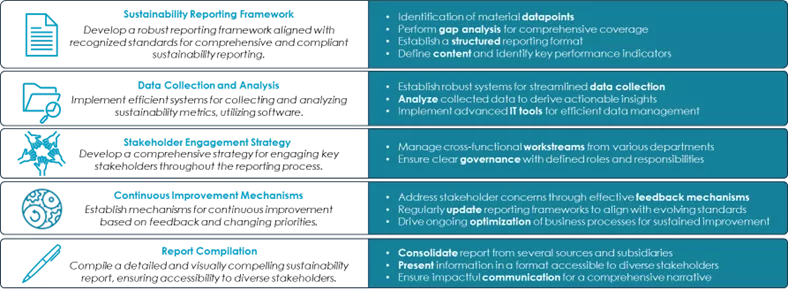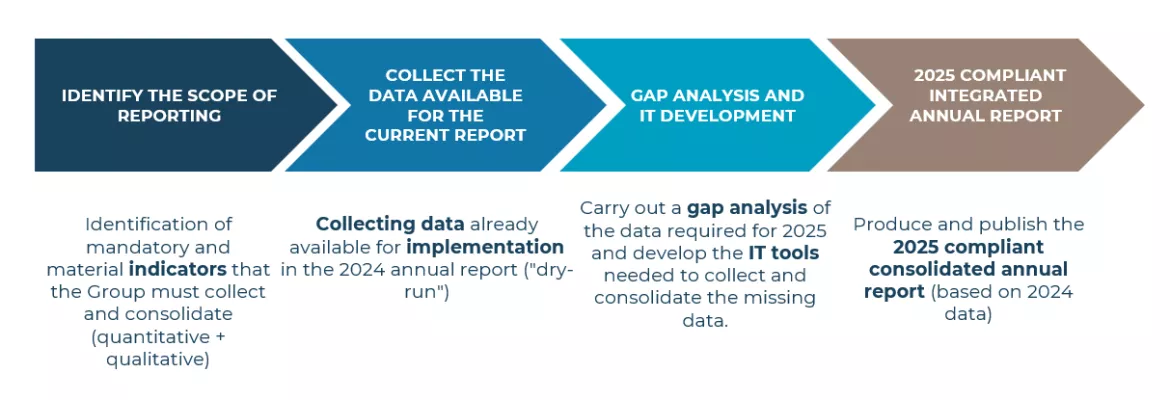The Corporate Sustainability Reporting Directive (CSRD) mandates new reporting requirements on environmental, social, and governance (ESG) factors. It aims to improve transparency and comparability among European companies on sustainability matters. But this new directive also presents a real opportunity for companies to enhance their sustainability strategies. This article will describe how the CSRD can strenghten you sustainability strategy, and how Avertim can provide support in the preparation for this reporting. This article will be concluded with a current case study of implementation of CSRD reporting through project management.
The CSRD can be considered as a strategic tool to improve sustainability strategy:
By adopting a more comprehensive view of sustainability
The reporting requirements include a wide range of ESG (Environmental, Social & Governance) factors. As all relevant aspects of sustainability are considered, this enables to promote balanced and integrated decision-making, and help spread sustainability throughout the organisation.
By prioritising initiatives and focusing resources on what matters.
The CSRD requires detailed reporting on various sustainability metrics, which fosters a culture of data-driven insights. Companies can leverage this data to identify trends, benchmark performance against peers, and uncover areas for improvement. This analytical approach enables more informed strategic planning and better resource allocation.
By driving long-term value creation.
By aligning sustainability goals with business objectives, companies can drive long-term value creation. The CSRD helps business to identify sustainable opportunities that can lead to innovation, cost savings, and new revenue streams. This alignement ensures that sustainability efforts contribute directly to the company's triple bottom line (environment, economic and social).
By aligning with stakeholders' expectations.
Through stakeholders engagement, an integrant part of the Double Materiality Assesment , companies understand their expectations, and integrate these insights into their sustainability strategy. This alignment ensures that the company's actions resonate with the values and demands of investors, customers, employees, and the community, building trust, strenghtening relationships, and improving retention
By identifying and mitigating risks.
The proactive approach on risks and opportunities identification done through the Double Materiality Assessment, allows companies to develop strategies to mitigate these risks, ensuring business continuity and resilience. Understanding and addressing actual or portential ESG risks, can also prevent financial losses and protect the company's reputation.
Here are some concrete examples of ESRS (European Sustainability Reporting Strandards) that could impact your sustainability strategy:
1. ESRS E1 focuses on climate change and requires reporting on greenhouse gas emissions, energy consumption and water use. In particular, the ESRS E1-1 demands details of the company's strategy (through the transition plan) and action plans for meeting climate change targets, including milestones and how these plans fit into the overall business strategy. This encourages companies to take concrete commitments and enables them to implement actionable plans, on which the CSRD requires a detailed progress report.
2. ESRS S1 focuses on the workforce, and adresses issues such as employees' working conditions, training hours or diversity. These elements, among the others from ESRS S1, play a key role in employee satisfaction and retention, can help to improve relations with the community and meet stakeholders' expectations.
3. ESRS G1, relating to business practices, aims to report on anti-corruption policies, board composition or ESG risk management. Strong governance is crucial to reduce the risk of fraud and improve decision-making processes. By ensuring a robust governance is in place, companies improve their risk management and encourage sustainable growth, making them more resilient and more attractive to investors.
How Avertim can help you?
At Avertim we help our clients comply with the CSRD and embed ESG requirements into their business strategies. With our support, our clients can effectively meet regulatory requirements and implement sustainable practices for long-term success.
Our approach
We approach reporting with our sustainability project methodology, placing greater emphasis on effective data management and compliance with reporting standards. Our aim is to help you track and communicate sustainability performance, by collecting relevant data, and preparing comprehensive sustainability reports for internal and external stakeholders.

Case Study: Ensuring effective compliance with the CSRD through project management.
We assist a Belgian insurance company with its CSRD reporting implementation. As project manager, our goal is to ensure the assimilation of this directive into our client's annual reporting framework which encompasses the following objectives :
- Become familiar with EFRAG (European Financial Reporting Advisory Group) standards
- Anticipatethe implementation of CSRD in the 2023 report published in 2024 (dry-run)
- Identify and implement the potential IT developments required to provide the data required to comply with the various regulations
- Publish in 2025 the 2024 report compliant with CSRD
Upon joining the project during its execution phase mid-2023, we orchestrated a through re-planning process that involved a recalibration of timelines, resource allocation, and risk mitigation strategies. We prioritized relevant KPIs (Key Performance Indicators) and coordinated the different contributors to ensure the timeline for data collection and report redaction were met. Our efforts culminated in the production of a 2024 integrated annual report disclosing a first exercise of Double Materiality Assessment, as well as a beginning of alignment to the CSRD.
In 2024, after supervising a thorough gap analysis, we continue to support our client on its reporting preparation, through the coordination and facilitation of a new Double Materiality Assessment aligned with the EFRAG guidance, the organization of workshops on material datapoints, the identification of available and missing data, and the preparation of a first draft of the 2025 report.
Global approach

At Avertim we understand the challenges that our clients are facing. Our expertiste and experience can help companies to ensure their compliance and improve the sustainability of their operations.
We can help you to create a solution tailored to your needs.


